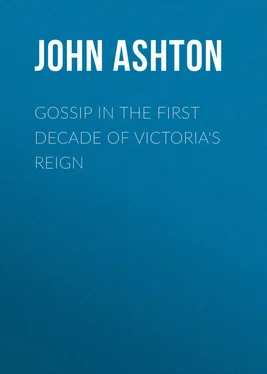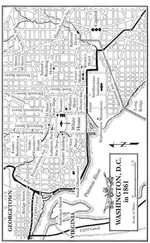John Ashton - Gossip in the First Decade of Victoria's Reign
Здесь есть возможность читать онлайн «John Ashton - Gossip in the First Decade of Victoria's Reign» — ознакомительный отрывок электронной книги совершенно бесплатно, а после прочтения отрывка купить полную версию. В некоторых случаях можно слушать аудио, скачать через торрент в формате fb2 и присутствует краткое содержание. ISBN: , Издательство: Иностранный паблик, Жанр: foreign_antique, foreign_prose, на английском языке. Описание произведения, (предисловие) а так же отзывы посетителей доступны на портале библиотеки ЛибКат.
- Название:Gossip in the First Decade of Victoria's Reign
- Автор:
- Издательство:Иностранный паблик
- Жанр:
- Год:неизвестен
- ISBN:http://www.gutenberg.org/ebooks/30665
- Рейтинг книги:3 / 5. Голосов: 1
-
Избранное:Добавить в избранное
- Отзывы:
-
Ваша оценка:
- 60
- 1
- 2
- 3
- 4
- 5
Gossip in the First Decade of Victoria's Reign: краткое содержание, описание и аннотация
Предлагаем к чтению аннотацию, описание, краткое содержание или предисловие (зависит от того, что написал сам автор книги «Gossip in the First Decade of Victoria's Reign»). Если вы не нашли необходимую информацию о книге — напишите в комментариях, мы постараемся отыскать её.
Gossip in the First Decade of Victoria's Reign — читать онлайн ознакомительный отрывок
Ниже представлен текст книги, разбитый по страницам. Система сохранения места последней прочитанной страницы, позволяет с удобством читать онлайн бесплатно книгу «Gossip in the First Decade of Victoria's Reign», без необходимости каждый раз заново искать на чём Вы остановились. Поставьте закладку, и сможете в любой момент перейти на страницу, на которой закончили чтение.
Интервал:
Закладка:
Mr. Minshull informed him that there was no appeal in the case, but he intimated that Mr. Ferguson might go to prison, if he pleased, instead of paying the fine.
Ferguson: Oh, there’s no occasion for that; I shall pay the fine.
Mr. Minshull then desired him to come round in front of the bench, and said to him: “I dare say, Sir, you have money enough at your disposal, but I pray you not to entertain the notion that you can therefore do as you think fit in the streets of this metropolis, either by night, or by day. You were brought before me, recently, for a similar offence, when I fined you £5, and I now warn you, that if you should again appear before me, under circumstances like the present, I shall, most assuredly, feel it to be my duty, not to inflict a pecuniary fine upon you – for that is no punishment to a person in your station – but I shall send you, at once, as I am authorized to do, to hard labour in the House of Correction, and you will then see that neither rank, nor riches, can entitle you to the privilege of committing depredations upon the property of peaceable and industrious persons, or of disturbing the peace and quiet of this town with impunity.”
The noble Lord was then handed over to the custody of the gaoler, and his two companions were discharged. It appeared that he had not sufficient money about him to pay the fines, but his brother, the Marquis of Waterford, after visiting him in “durance vile,” released him from his ignoble captivity by paying the fines.
On the same day, his brother, Lord James Beresford, was arrested for disgusting behaviour, and two “young men of genteel appearance,” who gave false names, were taken in custody by the police for maliciously upsetting a shell-fish stall.
One more illustration of the amusements and behaviour of the jeunesse dorée of that period will suffice. Times , 25 Nov.
Marlborough Street. – Lord Harley, of Chester Place, Capt. W. E. Reynolds, of Jermyn Street, and Mr. Charles Lushington, of Tavistock Hotel, were on Thursday (23 Nov.) brought before Mr. Chambers, charged with having practised the fashionable amusement of ringing door bells.
Mr. Young, surgeon, Piccadilly, said, about 5 o’clock that morning he was roused by a violent ringing at his bell. He answered the summons immediately.
Capt. Reynolds: It’s a – lie. You have committed perjury.
Mr. Lushington (to the complainant): You are a – liar. The fact is, I hurt my fingers and wanted some diachylum plaister, and I therefore rang the bell of the first surgeon I came to. This is the truth. So help me, God.
Mr. Young continued: When he got to the door, he found that all the three defendants had gone away; and he immediately followed them, and demanded their reason for disturbing him. The defendants turned upon him, and made use of language and epithets which he would not pollute his lips by repeating.
Capt. Reynolds (shaking his stick at the witness): I wish I had you elsewhere.
Mr. Lushington: I’d roll you in the kennel, if it was worth while.
Mr. Young continued: The altercation attracted the notice of the police, and witness gave them into custody. When they got to the station house, and witness was proceeding to make the charge, the defendants repeated their disgusting epithets and language.
It is impossible to do more than to remark that the language was of a description hitherto presumed to be confined to the vilest class of the community.
Mr. Young added that all the defendants appeared to be intoxicated.
Lord Harley: I beg pardon, I was sober.
Inspector Beresford was sworn to the fact.
Inspector: His Lordship was more intoxicated than the others.
Mr. Lushington (falling on his knees, and holding up his hands): I was not drunk this night – so help me, C-t.
The Inspector swore that none of the defendants were sober.
Mr. Lushington: The case shall be carried to a higher court.
Mr. Chambers: Then, to give you an opportunity of taking your case elsewhere, I shall make you all find bail; and Mr. Young, if he pleases, may prefer an indictment against you.
Mr. Chambers asked Mr. Lushington if he was a relative of Dr. Lushington, 1 1 Then a very active M.P.; afterwards Judge in the Admiralty and Probate Courts, Dean of Arches, &c.
and received a reply in the affirmative.
Capt. Reynolds said, if his language had been offensive towards the bench, he was sorry for having used it.
Mr. Chambers said, personally, he was indifferent to the language used to him.
The parties having left the box, Mr. Young told Mr. Chambers that he had no wish to press the case further. He wished an arrangement could be made, so that the bench could decide the matter summarily.
The defendants were acquainted with this very handsome conduct on the part of the complainant, and, after some discussion, Capt. Reynolds and Mr. Lushington agreed to pay £5 each to a charity.
Lord Harley was fined 5/– for being intoxicated.
When Mr. Chambers was inflicting the latter fine, he said to Lord Harley that he hoped he would exert his influence, if he had any, with some members of the Legislature, to get the fine for drunkenness increased to £1 where the party was a gentleman.
The defendants paid the fines, and went away.
CHAPTER II
Thames Tunnel flooded – First mention of the Nelson column – Moustaches – Sale of the King’s stud – Marriage by Registrar – Commencement of New Houses of Parliament – Lunatics and the Queen – The Queen’s visit to the Guildhall – Lord Beaconsfield’s maiden speech.
Nowadays very little is thought of making a tunnel under the Thames, but the first one, designed and carried out by Sir Marc Isambard Brunel, was regarded, and rightly so, as a most wonderful feat of engineering. One was proposed in 1799, and a shaft was sunk in 1804, but the work went no further. The one now spoken of was approved by Act of Parliament 24 June, 1824, and the shaft was begun and the first brick laid on 2 March, 1825. It suffered several times from irruptions of water; one, on 18 May, 1827; another, in which six lives were lost, on 12 Jan. 1828. In 1837 there were two irruptions, the first taking place on 23 August, and it is thus described by one of Brunel’s assistants: “We were at work about two o’clock on Wednesday, when we found the water coming in faster than usual. At first, we observed a quantity of loose sand falling near the gallery, which changed to thin, muddy drops. This convinced us that the stratum in which the men were working was bad, loose soil. The increase of water made it necessary to withdraw the men, which was done by a passage under the crown of the arch, made for their safety in case of accidents. No injury was sustained by any of the men. I was not satisfied, at the time, of the real extent of the bad soil, and I ordered a boat to be brought, with a rope of sufficient length to enable us to float to the shield. The boat was brought, but the rope attached to it, and by which we were to be hauled into the shaft, was shorter than we had ordered it. This deficiency probably saved our lives. We had not proceeded far in the boat when I perceived, by the twinkling of the lights in the tunnel, and other indications of inundation, that the waters came in with increased rapidity. I then gave the signal to be hauled into the shaft, and had scarcely done so when I observed the ground above give way, and the water descending in a thousand streams, like a cascade, or the Falls of Niagara. We were rescued, but, had the rope by which we were relieved from our perilous situation been of a length to allow the boat to go to the extremity of the tunnel, in all probability we should have been drowned. This happened about four o’clock, and, soon after five, the tunnel was entirely filled. No lives were lost. The only injury done is the suspension of the works. The steam engine, when the leak is stopped, will throw out a ton of water per minute; and, in three days and nights, the whole of the tunnel may be pumped dry.”
Читать дальшеИнтервал:
Закладка:
Похожие книги на «Gossip in the First Decade of Victoria's Reign»
Представляем Вашему вниманию похожие книги на «Gossip in the First Decade of Victoria's Reign» списком для выбора. Мы отобрали схожую по названию и смыслу литературу в надежде предоставить читателям больше вариантов отыскать новые, интересные, ещё непрочитанные произведения.
Обсуждение, отзывы о книге «Gossip in the First Decade of Victoria's Reign» и просто собственные мнения читателей. Оставьте ваши комментарии, напишите, что Вы думаете о произведении, его смысле или главных героях. Укажите что конкретно понравилось, а что нет, и почему Вы так считаете.












